Principles of Health and Social Care Report - Carehome UK
VerifiedAdded on 2020/02/05
|10
|4027
|357
Report
AI Summary
This report examines the principles of health and social care within a UK care home setting, focusing on the delivery of effective healthcare services to service users. The report investigates the application of different support principles, ethical dilemmas, and strategies to protect individuals from harm. It analyzes various policies, legislation, regulations, and codes of practice implemented in the workplace, highlighting their purpose and benefits. The report also explores the author's contribution to developing and implementing organizational policies, such as equality and diversity, and the importance of adhering to care standards. The conclusion emphasizes the significance of good practices, legislation, and organizational policies in delivering quality care and improving the health and well-being of service users, referencing the importance of considering cultural beliefs and providing equal treatment.
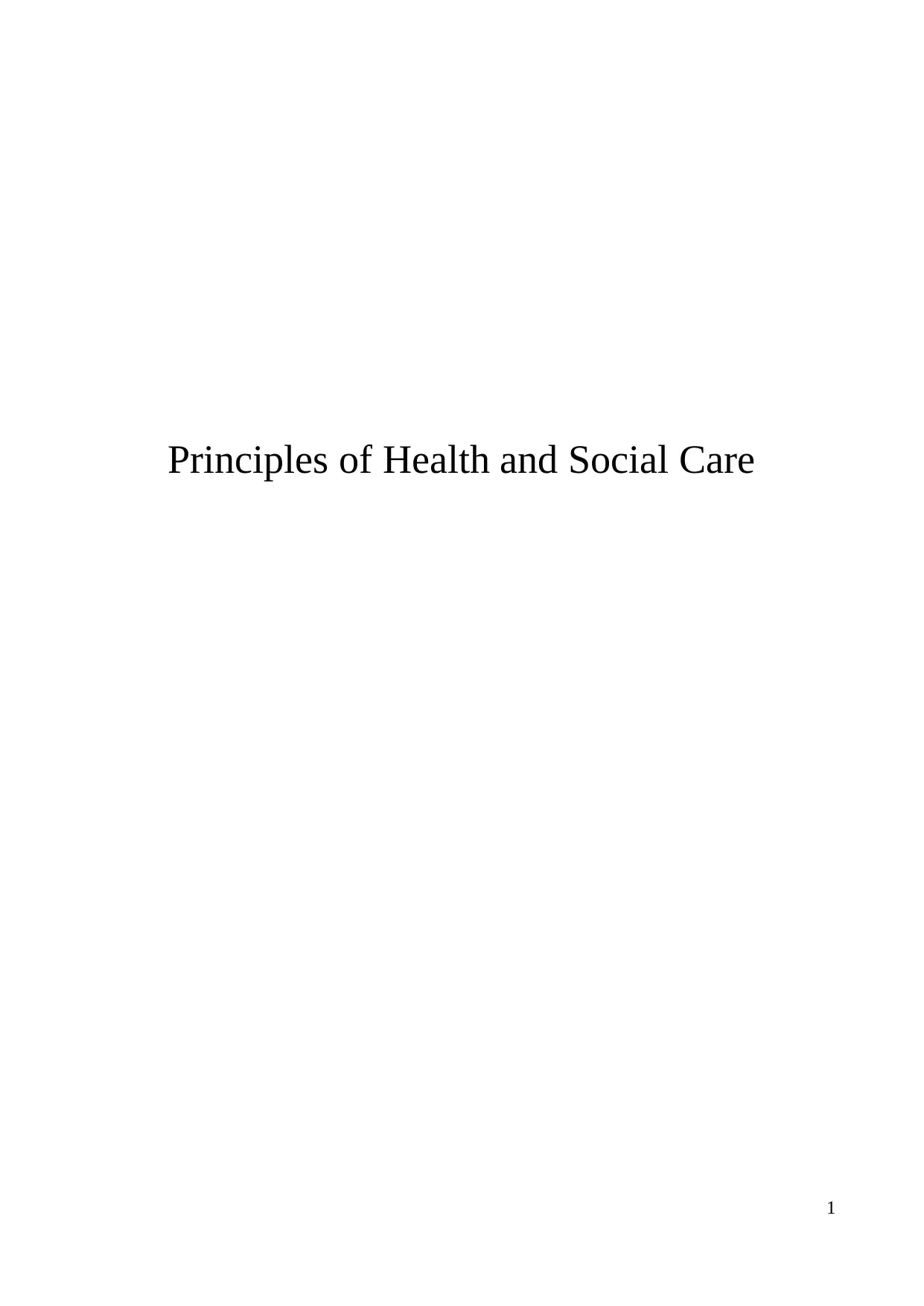
Principles of Health and Social Care
1
1
Paraphrase This Document
Need a fresh take? Get an instant paraphrase of this document with our AI Paraphraser
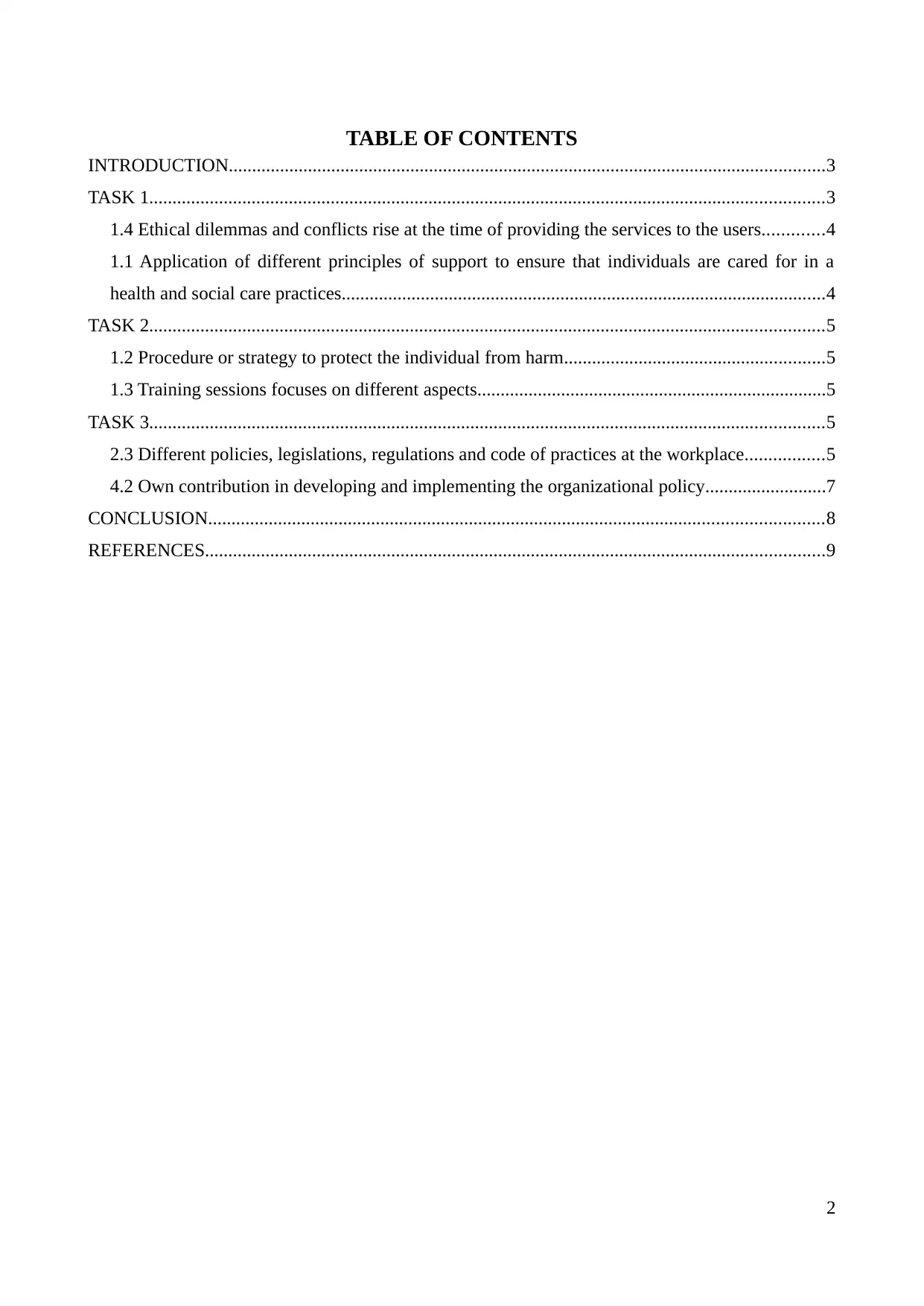
TABLE OF CONTENTS
INTRODUCTION................................................................................................................................3
TASK 1.................................................................................................................................................3
1.4 Ethical dilemmas and conflicts rise at the time of providing the services to the users.............4
1.1 Application of different principles of support to ensure that individuals are cared for in a
health and social care practices........................................................................................................4
TASK 2.................................................................................................................................................5
1.2 Procedure or strategy to protect the individual from harm........................................................5
1.3 Training sessions focuses on different aspects...........................................................................5
TASK 3.................................................................................................................................................5
2.3 Different policies, legislations, regulations and code of practices at the workplace.................5
4.2 Own contribution in developing and implementing the organizational policy..........................7
CONCLUSION....................................................................................................................................8
REFERENCES.....................................................................................................................................9
2
INTRODUCTION................................................................................................................................3
TASK 1.................................................................................................................................................3
1.4 Ethical dilemmas and conflicts rise at the time of providing the services to the users.............4
1.1 Application of different principles of support to ensure that individuals are cared for in a
health and social care practices........................................................................................................4
TASK 2.................................................................................................................................................5
1.2 Procedure or strategy to protect the individual from harm........................................................5
1.3 Training sessions focuses on different aspects...........................................................................5
TASK 3.................................................................................................................................................5
2.3 Different policies, legislations, regulations and code of practices at the workplace.................5
4.2 Own contribution in developing and implementing the organizational policy..........................7
CONCLUSION....................................................................................................................................8
REFERENCES.....................................................................................................................................9
2
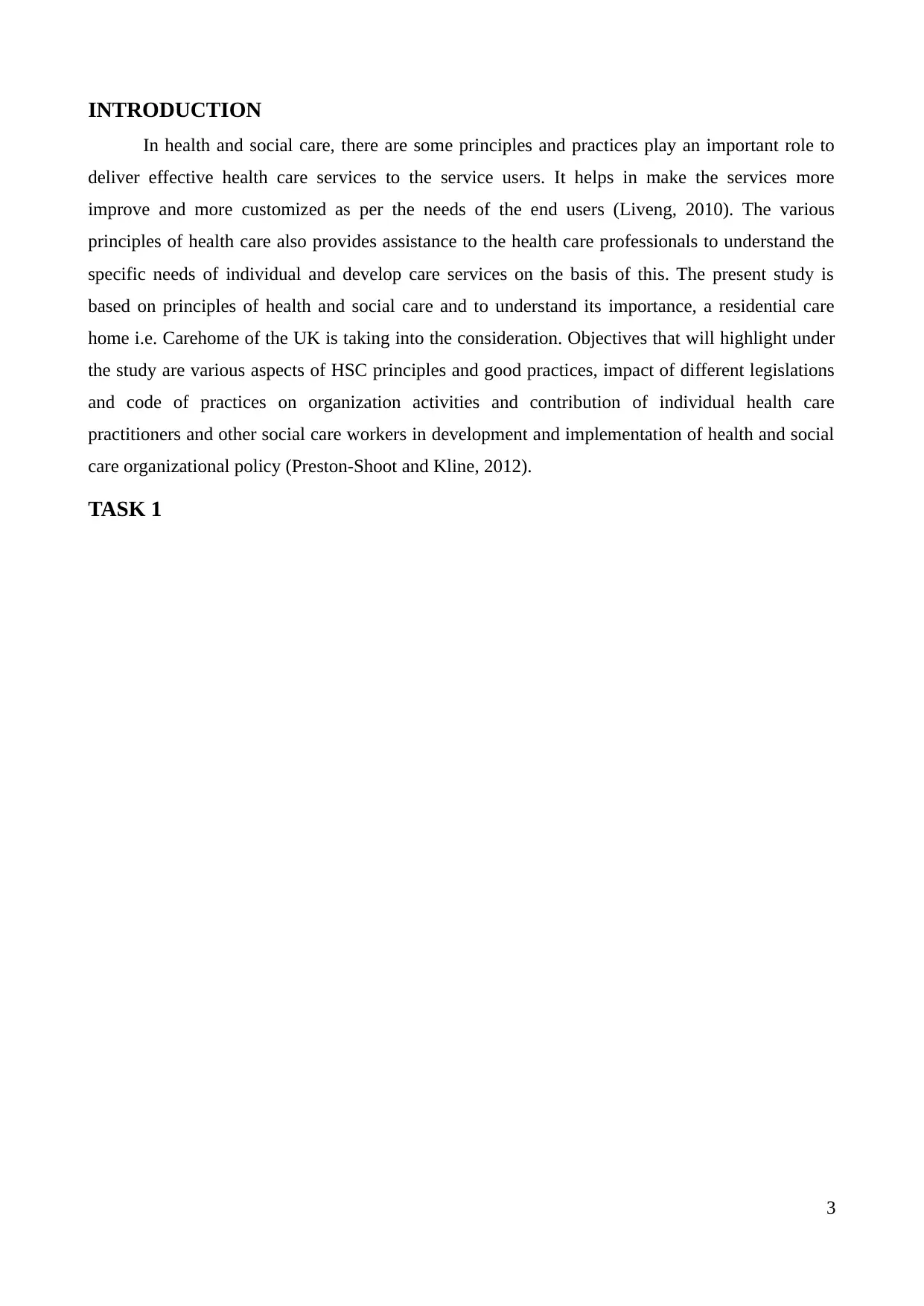
INTRODUCTION
In health and social care, there are some principles and practices play an important role to
deliver effective health care services to the service users. It helps in make the services more
improve and more customized as per the needs of the end users (Liveng, 2010). The various
principles of health care also provides assistance to the health care professionals to understand the
specific needs of individual and develop care services on the basis of this. The present study is
based on principles of health and social care and to understand its importance, a residential care
home i.e. Carehome of the UK is taking into the consideration. Objectives that will highlight under
the study are various aspects of HSC principles and good practices, impact of different legislations
and code of practices on organization activities and contribution of individual health care
practitioners and other social care workers in development and implementation of health and social
care organizational policy (Preston-Shoot and Kline, 2012).
TASK 1
3
In health and social care, there are some principles and practices play an important role to
deliver effective health care services to the service users. It helps in make the services more
improve and more customized as per the needs of the end users (Liveng, 2010). The various
principles of health care also provides assistance to the health care professionals to understand the
specific needs of individual and develop care services on the basis of this. The present study is
based on principles of health and social care and to understand its importance, a residential care
home i.e. Carehome of the UK is taking into the consideration. Objectives that will highlight under
the study are various aspects of HSC principles and good practices, impact of different legislations
and code of practices on organization activities and contribution of individual health care
practitioners and other social care workers in development and implementation of health and social
care organizational policy (Preston-Shoot and Kline, 2012).
TASK 1
3
⊘ This is a preview!⊘
Do you want full access?
Subscribe today to unlock all pages.

Trusted by 1+ million students worldwide
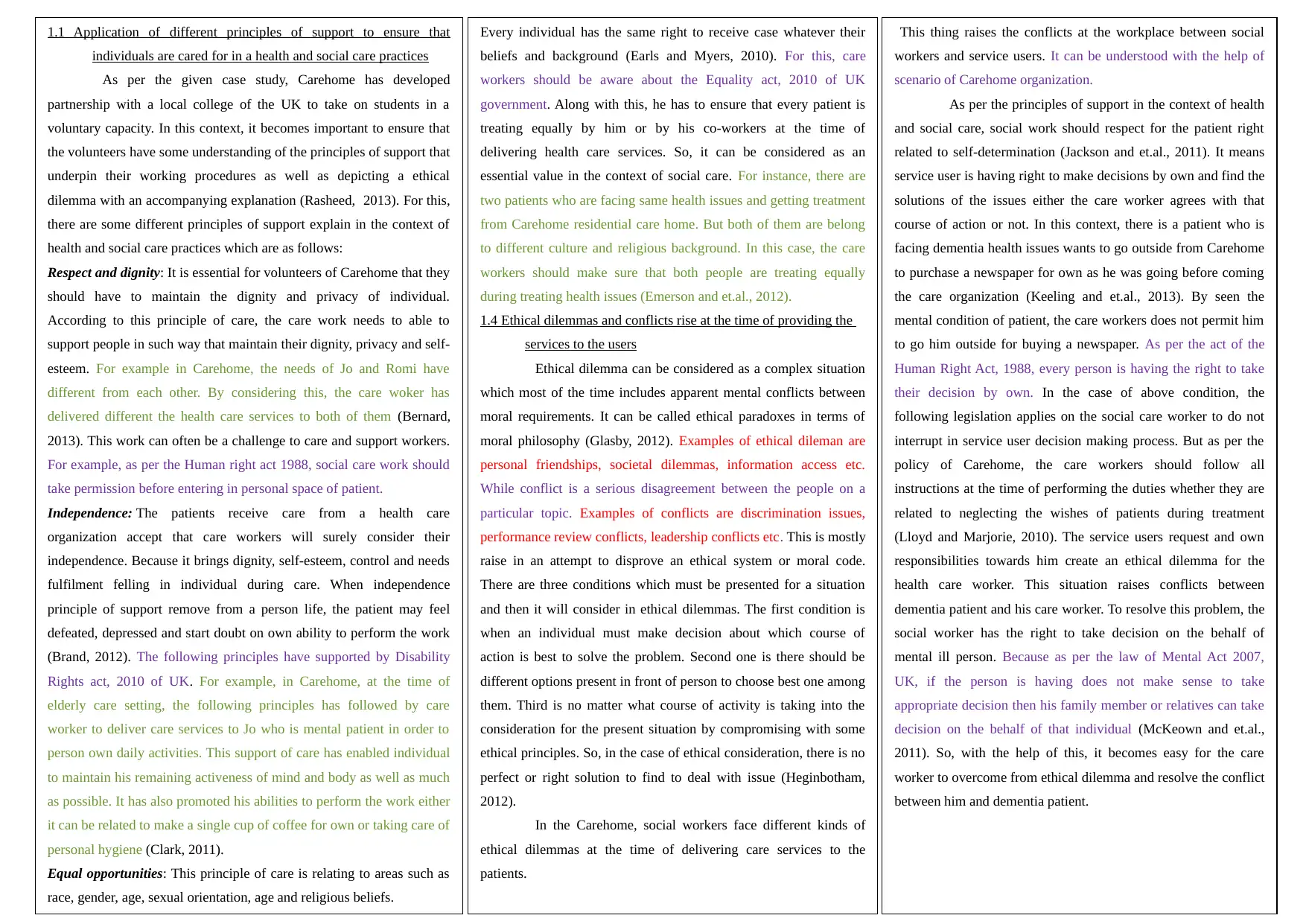
4
Every individual has the same right to receive case whatever their
beliefs and background (Earls and Myers, 2010). For this, care
workers should be aware about the Equality act, 2010 of UK
government. Along with this, he has to ensure that every patient is
treating equally by him or by his co-workers at the time of
delivering health care services. So, it can be considered as an
essential value in the context of social care. For instance, there are
two patients who are facing same health issues and getting treatment
from Carehome residential care home. But both of them are belong
to different culture and religious background. In this case, the care
workers should make sure that both people are treating equally
during treating health issues (Emerson and et.al., 2012).
1.4 Ethical dilemmas and conflicts rise at the time of providing the
services to the users
Ethical dilemma can be considered as a complex situation
which most of the time includes apparent mental conflicts between
moral requirements. It can be called ethical paradoxes in terms of
moral philosophy (Glasby, 2012). Examples of ethical dileman are
personal friendships, societal dilemmas, information access etc.
While conflict is a serious disagreement between the people on a
particular topic. Examples of conflicts are discrimination issues,
performance review conflicts, leadership conflicts etc. This is mostly
raise in an attempt to disprove an ethical system or moral code.
There are three conditions which must be presented for a situation
and then it will consider in ethical dilemmas. The first condition is
when an individual must make decision about which course of
action is best to solve the problem. Second one is there should be
different options present in front of person to choose best one among
them. Third is no matter what course of activity is taking into the
consideration for the present situation by compromising with some
ethical principles. So, in the case of ethical consideration, there is no
perfect or right solution to find to deal with issue (Heginbotham,
2012).
In the Carehome, social workers face different kinds of
ethical dilemmas at the time of delivering care services to the
patients.
1.1 Application of different principles of support to ensure that
individuals are cared for in a health and social care practices
As per the given case study, Carehome has developed
partnership with a local college of the UK to take on students in a
voluntary capacity. In this context, it becomes important to ensure that
the volunteers have some understanding of the principles of support that
underpin their working procedures as well as depicting a ethical
dilemma with an accompanying explanation (Rasheed, 2013). For this,
there are some different principles of support explain in the context of
health and social care practices which are as follows:
Respect and dignity: It is essential for volunteers of Carehome that they
should have to maintain the dignity and privacy of individual.
According to this principle of care, the care work needs to able to
support people in such way that maintain their dignity, privacy and self-
esteem. For example in Carehome, the needs of Jo and Romi have
different from each other. By considering this, the care woker has
delivered different the health care services to both of them (Bernard,
2013). This work can often be a challenge to care and support workers.
For example, as per the Human right act 1988, social care work should
take permission before entering in personal space of patient.
Independence: The patients receive care from a health care
organization accept that care workers will surely consider their
independence. Because it brings dignity, self-esteem, control and needs
fulfilment felling in individual during care. When independence
principle of support remove from a person life, the patient may feel
defeated, depressed and start doubt on own ability to perform the work
(Brand, 2012). The following principles have supported by Disability
Rights act, 2010 of UK. For example, in Carehome, at the time of
elderly care setting, the following principles has followed by care
worker to deliver care services to Jo who is mental patient in order to
person own daily activities. This support of care has enabled individual
to maintain his remaining activeness of mind and body as well as much
as possible. It has also promoted his abilities to perform the work either
it can be related to make a single cup of coffee for own or taking care of
personal hygiene (Clark, 2011).
Equal opportunities: This principle of care is relating to areas such as
race, gender, age, sexual orientation, age and religious beliefs.
This thing raises the conflicts at the workplace between social
workers and service users. It can be understood with the help of
scenario of Carehome organization.
As per the principles of support in the context of health
and social care, social work should respect for the patient right
related to self-determination (Jackson and et.al., 2011). It means
service user is having right to make decisions by own and find the
solutions of the issues either the care worker agrees with that
course of action or not. In this context, there is a patient who is
facing dementia health issues wants to go outside from Carehome
to purchase a newspaper for own as he was going before coming
the care organization (Keeling and et.al., 2013). By seen the
mental condition of patient, the care workers does not permit him
to go him outside for buying a newspaper. As per the act of the
Human Right Act, 1988, every person is having the right to take
their decision by own. In the case of above condition, the
following legislation applies on the social care worker to do not
interrupt in service user decision making process. But as per the
policy of Carehome, the care workers should follow all
instructions at the time of performing the duties whether they are
related to neglecting the wishes of patients during treatment
(Lloyd and Marjorie, 2010). The service users request and own
responsibilities towards him create an ethical dilemma for the
health care worker. This situation raises conflicts between
dementia patient and his care worker. To resolve this problem, the
social worker has the right to take decision on the behalf of
mental ill person. Because as per the law of Mental Act 2007,
UK, if the person is having does not make sense to take
appropriate decision then his family member or relatives can take
decision on the behalf of that individual (McKeown and et.al.,
2011). So, with the help of this, it becomes easy for the care
worker to overcome from ethical dilemma and resolve the conflict
between him and dementia patient.
Every individual has the same right to receive case whatever their
beliefs and background (Earls and Myers, 2010). For this, care
workers should be aware about the Equality act, 2010 of UK
government. Along with this, he has to ensure that every patient is
treating equally by him or by his co-workers at the time of
delivering health care services. So, it can be considered as an
essential value in the context of social care. For instance, there are
two patients who are facing same health issues and getting treatment
from Carehome residential care home. But both of them are belong
to different culture and religious background. In this case, the care
workers should make sure that both people are treating equally
during treating health issues (Emerson and et.al., 2012).
1.4 Ethical dilemmas and conflicts rise at the time of providing the
services to the users
Ethical dilemma can be considered as a complex situation
which most of the time includes apparent mental conflicts between
moral requirements. It can be called ethical paradoxes in terms of
moral philosophy (Glasby, 2012). Examples of ethical dileman are
personal friendships, societal dilemmas, information access etc.
While conflict is a serious disagreement between the people on a
particular topic. Examples of conflicts are discrimination issues,
performance review conflicts, leadership conflicts etc. This is mostly
raise in an attempt to disprove an ethical system or moral code.
There are three conditions which must be presented for a situation
and then it will consider in ethical dilemmas. The first condition is
when an individual must make decision about which course of
action is best to solve the problem. Second one is there should be
different options present in front of person to choose best one among
them. Third is no matter what course of activity is taking into the
consideration for the present situation by compromising with some
ethical principles. So, in the case of ethical consideration, there is no
perfect or right solution to find to deal with issue (Heginbotham,
2012).
In the Carehome, social workers face different kinds of
ethical dilemmas at the time of delivering care services to the
patients.
1.1 Application of different principles of support to ensure that
individuals are cared for in a health and social care practices
As per the given case study, Carehome has developed
partnership with a local college of the UK to take on students in a
voluntary capacity. In this context, it becomes important to ensure that
the volunteers have some understanding of the principles of support that
underpin their working procedures as well as depicting a ethical
dilemma with an accompanying explanation (Rasheed, 2013). For this,
there are some different principles of support explain in the context of
health and social care practices which are as follows:
Respect and dignity: It is essential for volunteers of Carehome that they
should have to maintain the dignity and privacy of individual.
According to this principle of care, the care work needs to able to
support people in such way that maintain their dignity, privacy and self-
esteem. For example in Carehome, the needs of Jo and Romi have
different from each other. By considering this, the care woker has
delivered different the health care services to both of them (Bernard,
2013). This work can often be a challenge to care and support workers.
For example, as per the Human right act 1988, social care work should
take permission before entering in personal space of patient.
Independence: The patients receive care from a health care
organization accept that care workers will surely consider their
independence. Because it brings dignity, self-esteem, control and needs
fulfilment felling in individual during care. When independence
principle of support remove from a person life, the patient may feel
defeated, depressed and start doubt on own ability to perform the work
(Brand, 2012). The following principles have supported by Disability
Rights act, 2010 of UK. For example, in Carehome, at the time of
elderly care setting, the following principles has followed by care
worker to deliver care services to Jo who is mental patient in order to
person own daily activities. This support of care has enabled individual
to maintain his remaining activeness of mind and body as well as much
as possible. It has also promoted his abilities to perform the work either
it can be related to make a single cup of coffee for own or taking care of
personal hygiene (Clark, 2011).
Equal opportunities: This principle of care is relating to areas such as
race, gender, age, sexual orientation, age and religious beliefs.
This thing raises the conflicts at the workplace between social
workers and service users. It can be understood with the help of
scenario of Carehome organization.
As per the principles of support in the context of health
and social care, social work should respect for the patient right
related to self-determination (Jackson and et.al., 2011). It means
service user is having right to make decisions by own and find the
solutions of the issues either the care worker agrees with that
course of action or not. In this context, there is a patient who is
facing dementia health issues wants to go outside from Carehome
to purchase a newspaper for own as he was going before coming
the care organization (Keeling and et.al., 2013). By seen the
mental condition of patient, the care workers does not permit him
to go him outside for buying a newspaper. As per the act of the
Human Right Act, 1988, every person is having the right to take
their decision by own. In the case of above condition, the
following legislation applies on the social care worker to do not
interrupt in service user decision making process. But as per the
policy of Carehome, the care workers should follow all
instructions at the time of performing the duties whether they are
related to neglecting the wishes of patients during treatment
(Lloyd and Marjorie, 2010). The service users request and own
responsibilities towards him create an ethical dilemma for the
health care worker. This situation raises conflicts between
dementia patient and his care worker. To resolve this problem, the
social worker has the right to take decision on the behalf of
mental ill person. Because as per the law of Mental Act 2007,
UK, if the person is having does not make sense to take
appropriate decision then his family member or relatives can take
decision on the behalf of that individual (McKeown and et.al.,
2011). So, with the help of this, it becomes easy for the care
worker to overcome from ethical dilemma and resolve the conflict
between him and dementia patient.
Paraphrase This Document
Need a fresh take? Get an instant paraphrase of this document with our AI Paraphraser
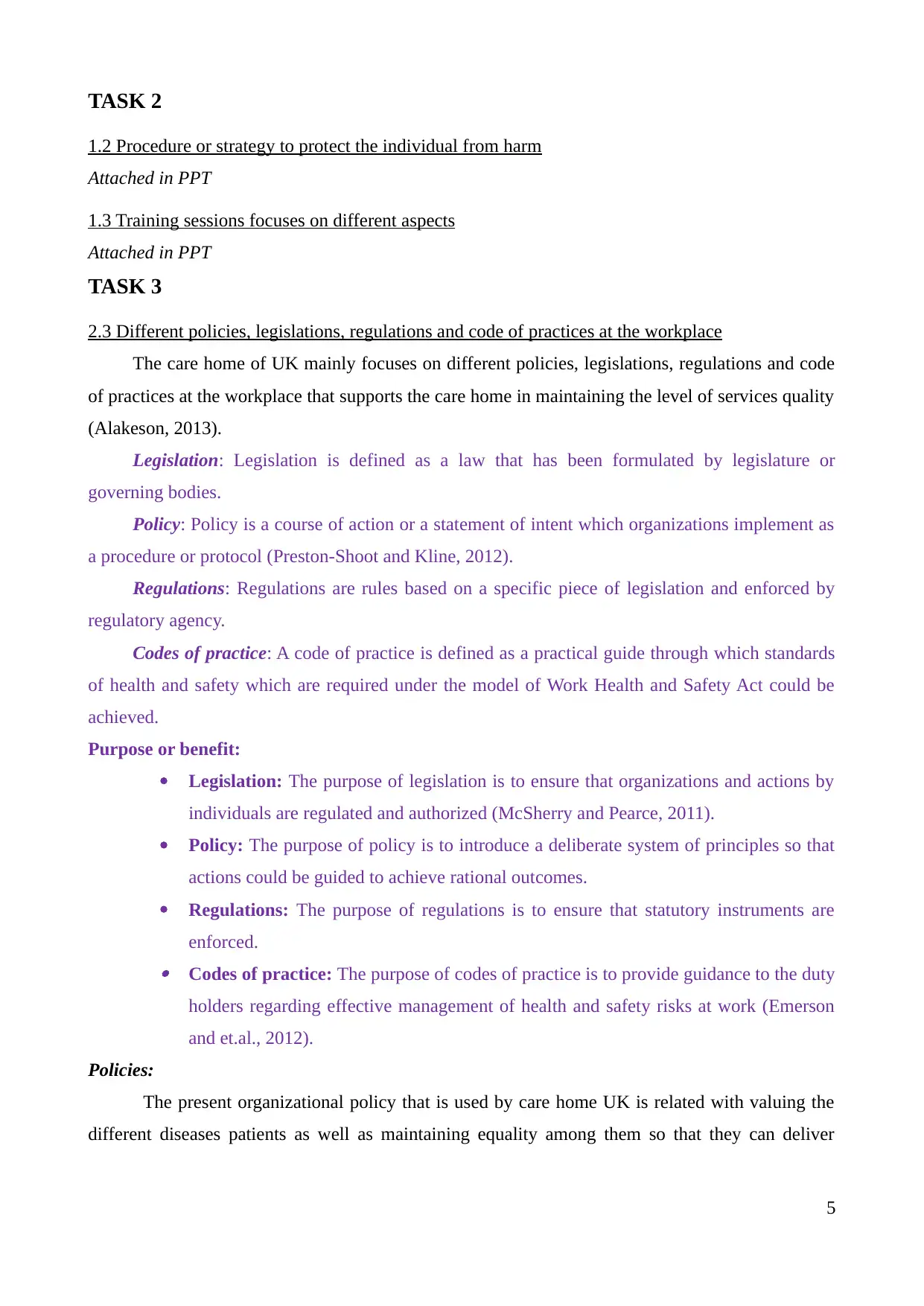
TASK 2
1.2 Procedure or strategy to protect the individual from harm
Attached in PPT
1.3 Training sessions focuses on different aspects
Attached in PPT
TASK 3
2.3 Different policies, legislations, regulations and code of practices at the workplace
The care home of UK mainly focuses on different policies, legislations, regulations and code
of practices at the workplace that supports the care home in maintaining the level of services quality
(Alakeson, 2013).
Legislation: Legislation is defined as a law that has been formulated by legislature or
governing bodies.
Policy: Policy is a course of action or a statement of intent which organizations implement as
a procedure or protocol (Preston-Shoot and Kline, 2012).
Regulations: Regulations are rules based on a specific piece of legislation and enforced by
regulatory agency.
Codes of practice: A code of practice is defined as a practical guide through which standards
of health and safety which are required under the model of Work Health and Safety Act could be
achieved.
Purpose or benefit:
Legislation: The purpose of legislation is to ensure that organizations and actions by
individuals are regulated and authorized (McSherry and Pearce, 2011).
Policy: The purpose of policy is to introduce a deliberate system of principles so that
actions could be guided to achieve rational outcomes.
Regulations: The purpose of regulations is to ensure that statutory instruments are
enforced.
Codes of practice: The purpose of codes of practice is to provide guidance to the duty
holders regarding effective management of health and safety risks at work (Emerson
and et.al., 2012).
Policies:
The present organizational policy that is used by care home UK is related with valuing the
different diseases patients as well as maintaining equality among them so that they can deliver
5
1.2 Procedure or strategy to protect the individual from harm
Attached in PPT
1.3 Training sessions focuses on different aspects
Attached in PPT
TASK 3
2.3 Different policies, legislations, regulations and code of practices at the workplace
The care home of UK mainly focuses on different policies, legislations, regulations and code
of practices at the workplace that supports the care home in maintaining the level of services quality
(Alakeson, 2013).
Legislation: Legislation is defined as a law that has been formulated by legislature or
governing bodies.
Policy: Policy is a course of action or a statement of intent which organizations implement as
a procedure or protocol (Preston-Shoot and Kline, 2012).
Regulations: Regulations are rules based on a specific piece of legislation and enforced by
regulatory agency.
Codes of practice: A code of practice is defined as a practical guide through which standards
of health and safety which are required under the model of Work Health and Safety Act could be
achieved.
Purpose or benefit:
Legislation: The purpose of legislation is to ensure that organizations and actions by
individuals are regulated and authorized (McSherry and Pearce, 2011).
Policy: The purpose of policy is to introduce a deliberate system of principles so that
actions could be guided to achieve rational outcomes.
Regulations: The purpose of regulations is to ensure that statutory instruments are
enforced.
Codes of practice: The purpose of codes of practice is to provide guidance to the duty
holders regarding effective management of health and safety risks at work (Emerson
and et.al., 2012).
Policies:
The present organizational policy that is used by care home UK is related with valuing the
different diseases patients as well as maintaining equality among them so that they can deliver
5
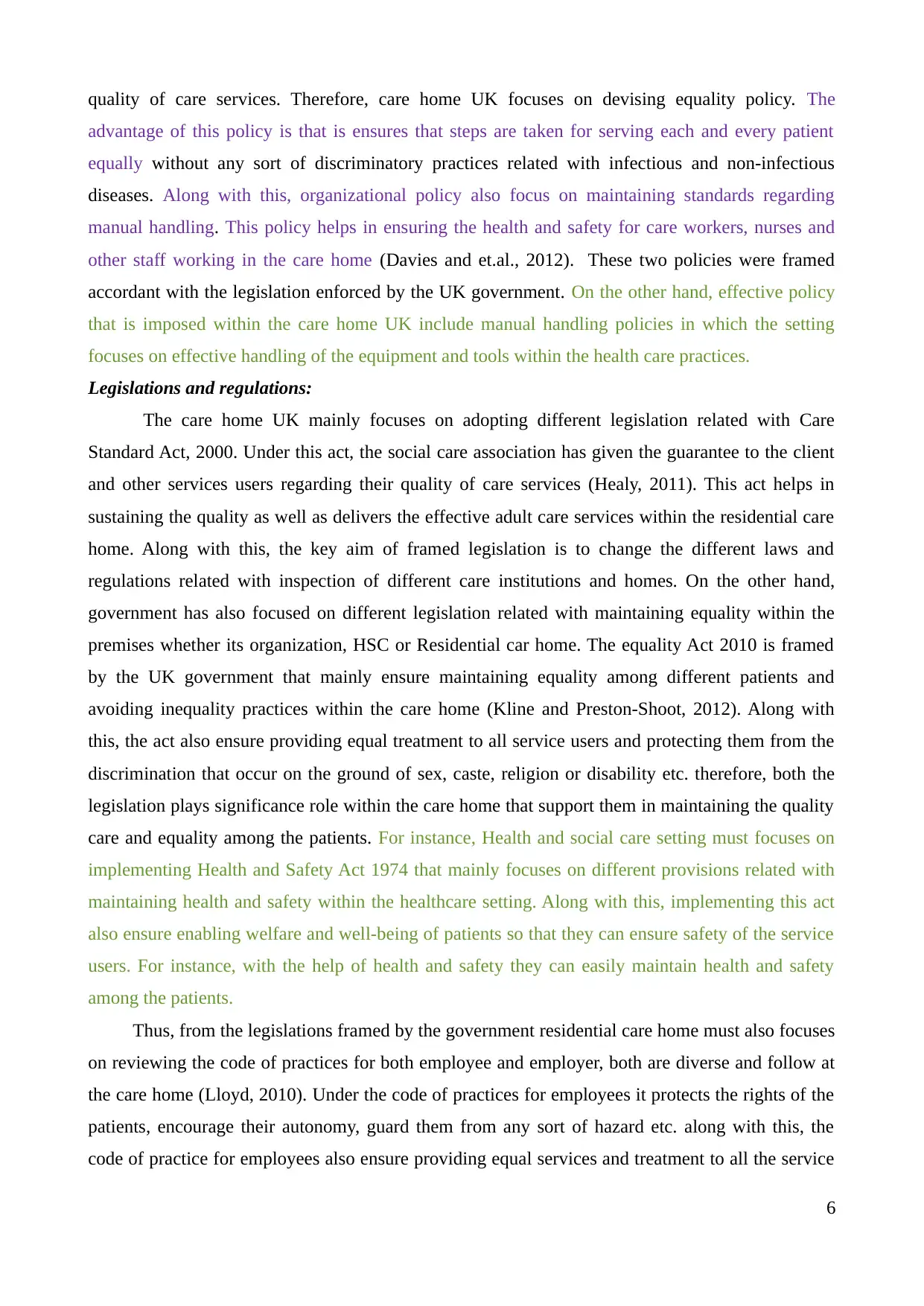
quality of care services. Therefore, care home UK focuses on devising equality policy. The
advantage of this policy is that is ensures that steps are taken for serving each and every patient
equally without any sort of discriminatory practices related with infectious and non-infectious
diseases. Along with this, organizational policy also focus on maintaining standards regarding
manual handling. This policy helps in ensuring the health and safety for care workers, nurses and
other staff working in the care home (Davies and et.al., 2012). These two policies were framed
accordant with the legislation enforced by the UK government. On the other hand, effective policy
that is imposed within the care home UK include manual handling policies in which the setting
focuses on effective handling of the equipment and tools within the health care practices.
Legislations and regulations:
The care home UK mainly focuses on adopting different legislation related with Care
Standard Act, 2000. Under this act, the social care association has given the guarantee to the client
and other services users regarding their quality of care services (Healy, 2011). This act helps in
sustaining the quality as well as delivers the effective adult care services within the residential care
home. Along with this, the key aim of framed legislation is to change the different laws and
regulations related with inspection of different care institutions and homes. On the other hand,
government has also focused on different legislation related with maintaining equality within the
premises whether its organization, HSC or Residential car home. The equality Act 2010 is framed
by the UK government that mainly ensure maintaining equality among different patients and
avoiding inequality practices within the care home (Kline and Preston-Shoot, 2012). Along with
this, the act also ensure providing equal treatment to all service users and protecting them from the
discrimination that occur on the ground of sex, caste, religion or disability etc. therefore, both the
legislation plays significance role within the care home that support them in maintaining the quality
care and equality among the patients. For instance, Health and social care setting must focuses on
implementing Health and Safety Act 1974 that mainly focuses on different provisions related with
maintaining health and safety within the healthcare setting. Along with this, implementing this act
also ensure enabling welfare and well-being of patients so that they can ensure safety of the service
users. For instance, with the help of health and safety they can easily maintain health and safety
among the patients.
Thus, from the legislations framed by the government residential care home must also focuses
on reviewing the code of practices for both employee and employer, both are diverse and follow at
the care home (Lloyd, 2010). Under the code of practices for employees it protects the rights of the
patients, encourage their autonomy, guard them from any sort of hazard etc. along with this, the
code of practice for employees also ensure providing equal services and treatment to all the service
6
advantage of this policy is that is ensures that steps are taken for serving each and every patient
equally without any sort of discriminatory practices related with infectious and non-infectious
diseases. Along with this, organizational policy also focus on maintaining standards regarding
manual handling. This policy helps in ensuring the health and safety for care workers, nurses and
other staff working in the care home (Davies and et.al., 2012). These two policies were framed
accordant with the legislation enforced by the UK government. On the other hand, effective policy
that is imposed within the care home UK include manual handling policies in which the setting
focuses on effective handling of the equipment and tools within the health care practices.
Legislations and regulations:
The care home UK mainly focuses on adopting different legislation related with Care
Standard Act, 2000. Under this act, the social care association has given the guarantee to the client
and other services users regarding their quality of care services (Healy, 2011). This act helps in
sustaining the quality as well as delivers the effective adult care services within the residential care
home. Along with this, the key aim of framed legislation is to change the different laws and
regulations related with inspection of different care institutions and homes. On the other hand,
government has also focused on different legislation related with maintaining equality within the
premises whether its organization, HSC or Residential car home. The equality Act 2010 is framed
by the UK government that mainly ensure maintaining equality among different patients and
avoiding inequality practices within the care home (Kline and Preston-Shoot, 2012). Along with
this, the act also ensure providing equal treatment to all service users and protecting them from the
discrimination that occur on the ground of sex, caste, religion or disability etc. therefore, both the
legislation plays significance role within the care home that support them in maintaining the quality
care and equality among the patients. For instance, Health and social care setting must focuses on
implementing Health and Safety Act 1974 that mainly focuses on different provisions related with
maintaining health and safety within the healthcare setting. Along with this, implementing this act
also ensure enabling welfare and well-being of patients so that they can ensure safety of the service
users. For instance, with the help of health and safety they can easily maintain health and safety
among the patients.
Thus, from the legislations framed by the government residential care home must also focuses
on reviewing the code of practices for both employee and employer, both are diverse and follow at
the care home (Lloyd, 2010). Under the code of practices for employees it protects the rights of the
patients, encourage their autonomy, guard them from any sort of hazard etc. along with this, the
code of practice for employees also ensure providing equal services and treatment to all the service
6
⊘ This is a preview!⊘
Do you want full access?
Subscribe today to unlock all pages.

Trusted by 1+ million students worldwide
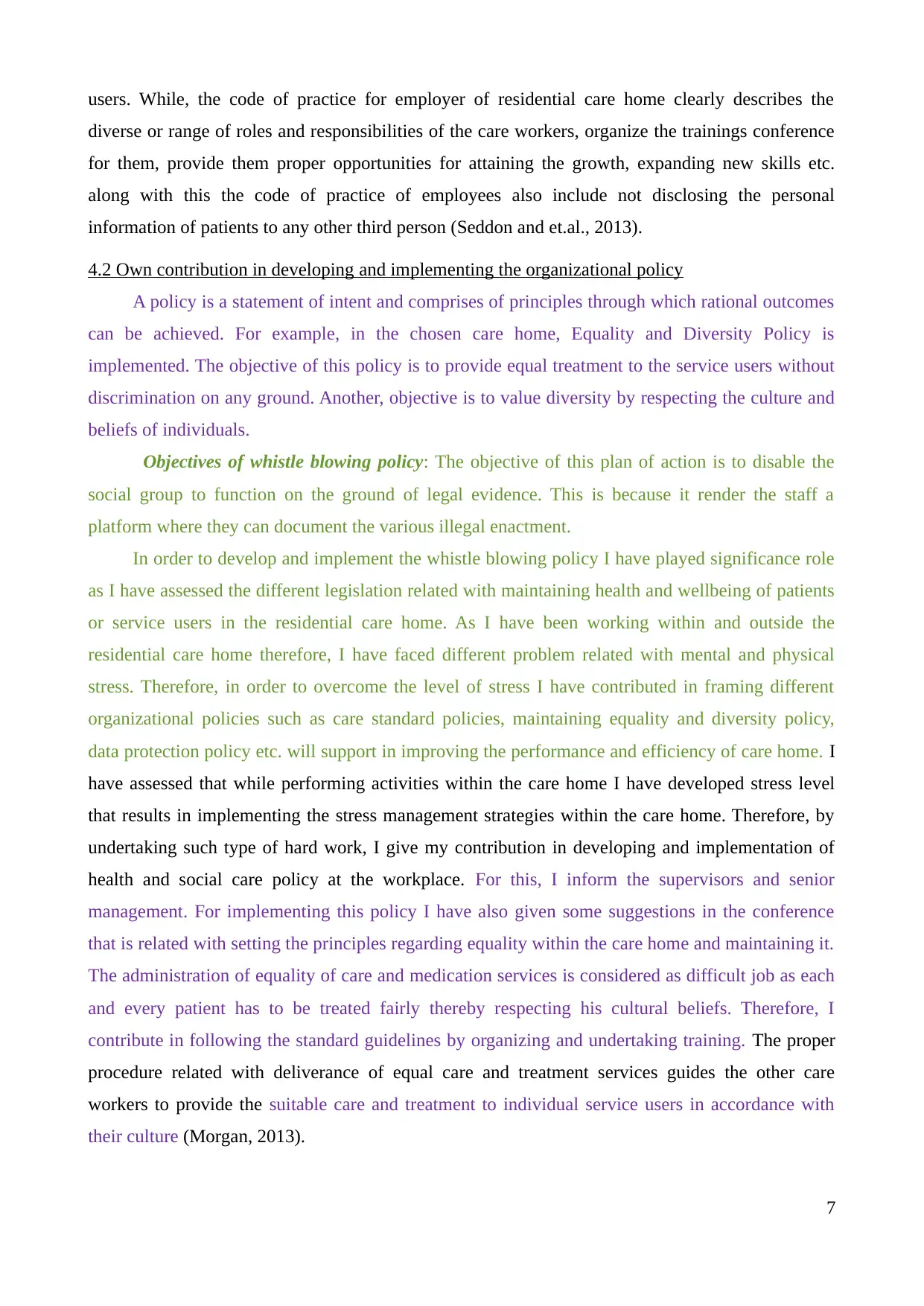
users. While, the code of practice for employer of residential care home clearly describes the
diverse or range of roles and responsibilities of the care workers, organize the trainings conference
for them, provide them proper opportunities for attaining the growth, expanding new skills etc.
along with this the code of practice of employees also include not disclosing the personal
information of patients to any other third person (Seddon and et.al., 2013).
4.2 Own contribution in developing and implementing the organizational policy
A policy is a statement of intent and comprises of principles through which rational outcomes
can be achieved. For example, in the chosen care home, Equality and Diversity Policy is
implemented. The objective of this policy is to provide equal treatment to the service users without
discrimination on any ground. Another, objective is to value diversity by respecting the culture and
beliefs of individuals.
Objectives of whistle blowing policy: The objective of this plan of action is to disable the
social group to function on the ground of legal evidence. This is because it render the staff a
platform where they can document the various illegal enactment.
In order to develop and implement the whistle blowing policy I have played significance role
as I have assessed the different legislation related with maintaining health and wellbeing of patients
or service users in the residential care home. As I have been working within and outside the
residential care home therefore, I have faced different problem related with mental and physical
stress. Therefore, in order to overcome the level of stress I have contributed in framing different
organizational policies such as care standard policies, maintaining equality and diversity policy,
data protection policy etc. will support in improving the performance and efficiency of care home. I
have assessed that while performing activities within the care home I have developed stress level
that results in implementing the stress management strategies within the care home. Therefore, by
undertaking such type of hard work, I give my contribution in developing and implementation of
health and social care policy at the workplace. For this, I inform the supervisors and senior
management. For implementing this policy I have also given some suggestions in the conference
that is related with setting the principles regarding equality within the care home and maintaining it.
The administration of equality of care and medication services is considered as difficult job as each
and every patient has to be treated fairly thereby respecting his cultural beliefs. Therefore, I
contribute in following the standard guidelines by organizing and undertaking training. The proper
procedure related with deliverance of equal care and treatment services guides the other care
workers to provide the suitable care and treatment to individual service users in accordance with
their culture (Morgan, 2013).
7
diverse or range of roles and responsibilities of the care workers, organize the trainings conference
for them, provide them proper opportunities for attaining the growth, expanding new skills etc.
along with this the code of practice of employees also include not disclosing the personal
information of patients to any other third person (Seddon and et.al., 2013).
4.2 Own contribution in developing and implementing the organizational policy
A policy is a statement of intent and comprises of principles through which rational outcomes
can be achieved. For example, in the chosen care home, Equality and Diversity Policy is
implemented. The objective of this policy is to provide equal treatment to the service users without
discrimination on any ground. Another, objective is to value diversity by respecting the culture and
beliefs of individuals.
Objectives of whistle blowing policy: The objective of this plan of action is to disable the
social group to function on the ground of legal evidence. This is because it render the staff a
platform where they can document the various illegal enactment.
In order to develop and implement the whistle blowing policy I have played significance role
as I have assessed the different legislation related with maintaining health and wellbeing of patients
or service users in the residential care home. As I have been working within and outside the
residential care home therefore, I have faced different problem related with mental and physical
stress. Therefore, in order to overcome the level of stress I have contributed in framing different
organizational policies such as care standard policies, maintaining equality and diversity policy,
data protection policy etc. will support in improving the performance and efficiency of care home. I
have assessed that while performing activities within the care home I have developed stress level
that results in implementing the stress management strategies within the care home. Therefore, by
undertaking such type of hard work, I give my contribution in developing and implementation of
health and social care policy at the workplace. For this, I inform the supervisors and senior
management. For implementing this policy I have also given some suggestions in the conference
that is related with setting the principles regarding equality within the care home and maintaining it.
The administration of equality of care and medication services is considered as difficult job as each
and every patient has to be treated fairly thereby respecting his cultural beliefs. Therefore, I
contribute in following the standard guidelines by organizing and undertaking training. The proper
procedure related with deliverance of equal care and treatment services guides the other care
workers to provide the suitable care and treatment to individual service users in accordance with
their culture (Morgan, 2013).
7
Paraphrase This Document
Need a fresh take? Get an instant paraphrase of this document with our AI Paraphraser
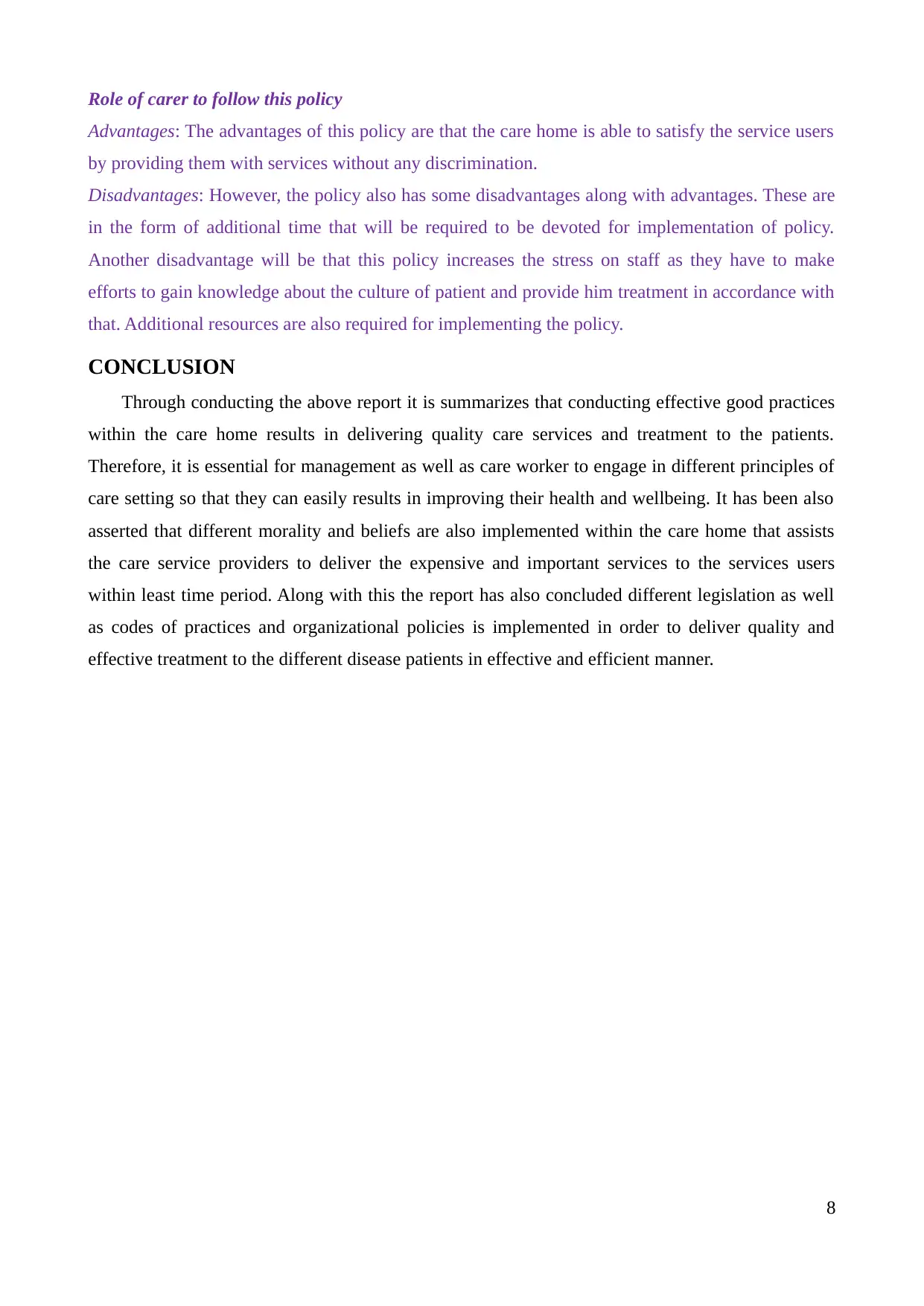
Role of carer to follow this policy
Advantages: The advantages of this policy are that the care home is able to satisfy the service users
by providing them with services without any discrimination.
Disadvantages: However, the policy also has some disadvantages along with advantages. These are
in the form of additional time that will be required to be devoted for implementation of policy.
Another disadvantage will be that this policy increases the stress on staff as they have to make
efforts to gain knowledge about the culture of patient and provide him treatment in accordance with
that. Additional resources are also required for implementing the policy.
CONCLUSION
Through conducting the above report it is summarizes that conducting effective good practices
within the care home results in delivering quality care services and treatment to the patients.
Therefore, it is essential for management as well as care worker to engage in different principles of
care setting so that they can easily results in improving their health and wellbeing. It has been also
asserted that different morality and beliefs are also implemented within the care home that assists
the care service providers to deliver the expensive and important services to the services users
within least time period. Along with this the report has also concluded different legislation as well
as codes of practices and organizational policies is implemented in order to deliver quality and
effective treatment to the different disease patients in effective and efficient manner.
8
Advantages: The advantages of this policy are that the care home is able to satisfy the service users
by providing them with services without any discrimination.
Disadvantages: However, the policy also has some disadvantages along with advantages. These are
in the form of additional time that will be required to be devoted for implementation of policy.
Another disadvantage will be that this policy increases the stress on staff as they have to make
efforts to gain knowledge about the culture of patient and provide him treatment in accordance with
that. Additional resources are also required for implementing the policy.
CONCLUSION
Through conducting the above report it is summarizes that conducting effective good practices
within the care home results in delivering quality care services and treatment to the patients.
Therefore, it is essential for management as well as care worker to engage in different principles of
care setting so that they can easily results in improving their health and wellbeing. It has been also
asserted that different morality and beliefs are also implemented within the care home that assists
the care service providers to deliver the expensive and important services to the services users
within least time period. Along with this the report has also concluded different legislation as well
as codes of practices and organizational policies is implemented in order to deliver quality and
effective treatment to the different disease patients in effective and efficient manner.
8
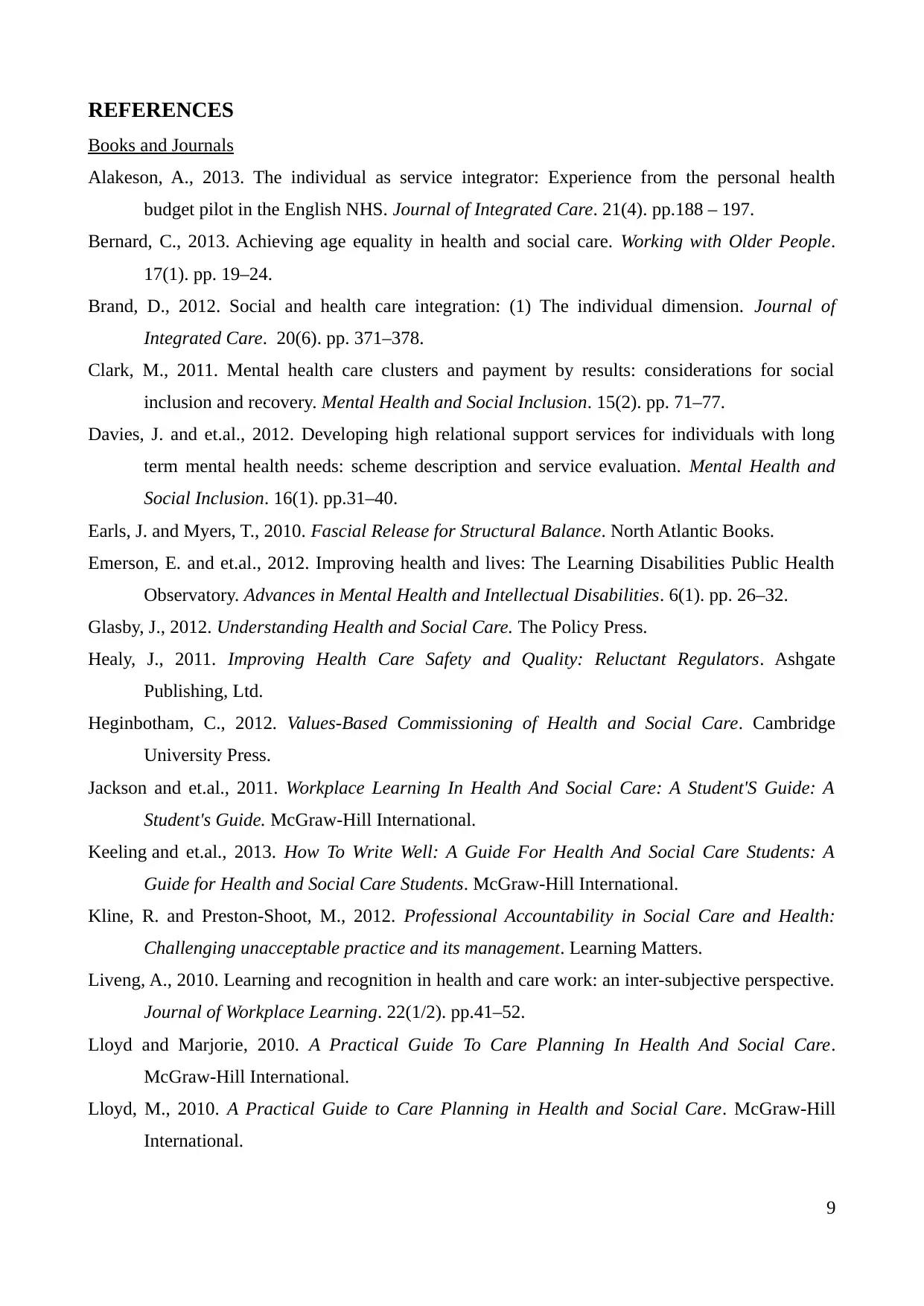
REFERENCES
Books and Journals
Alakeson, A., 2013. The individual as service integrator: Experience from the personal health
budget pilot in the English NHS. Journal of Integrated Care. 21(4). pp.188 – 197.
Bernard, C., 2013. Achieving age equality in health and social care. Working with Older People.
17(1). pp. 19–24.
Brand, D., 2012. Social and health care integration: (1) The individual dimension. Journal of
Integrated Care. 20(6). pp. 371–378.
Clark, M., 2011. Mental health care clusters and payment by results: considerations for social
inclusion and recovery. Mental Health and Social Inclusion. 15(2). pp. 71–77.
Davies, J. and et.al., 2012. Developing high relational support services for individuals with long
term mental health needs: scheme description and service evaluation. Mental Health and
Social Inclusion. 16(1). pp.31–40.
Earls, J. and Myers, T., 2010. Fascial Release for Structural Balance. North Atlantic Books.
Emerson, E. and et.al., 2012. Improving health and lives: The Learning Disabilities Public Health
Observatory. Advances in Mental Health and Intellectual Disabilities. 6(1). pp. 26–32.
Glasby, J., 2012. Understanding Health and Social Care. The Policy Press.
Healy, J., 2011. Improving Health Care Safety and Quality: Reluctant Regulators. Ashgate
Publishing, Ltd.
Heginbotham, C., 2012. Values-Based Commissioning of Health and Social Care. Cambridge
University Press.
Jackson and et.al., 2011. Workplace Learning In Health And Social Care: A Student'S Guide: A
Student's Guide. McGraw-Hill International.
Keeling and et.al., 2013. How To Write Well: A Guide For Health And Social Care Students: A
Guide for Health and Social Care Students. McGraw-Hill International.
Kline, R. and Preston-Shoot, M., 2012. Professional Accountability in Social Care and Health:
Challenging unacceptable practice and its management. Learning Matters.
Liveng, A., 2010. Learning and recognition in health and care work: an inter-subjective perspective.
Journal of Workplace Learning. 22(1/2). pp.41–52.
Lloyd and Marjorie, 2010. A Practical Guide To Care Planning In Health And Social Care.
McGraw-Hill International.
Lloyd, M., 2010. A Practical Guide to Care Planning in Health and Social Care. McGraw-Hill
International.
9
Books and Journals
Alakeson, A., 2013. The individual as service integrator: Experience from the personal health
budget pilot in the English NHS. Journal of Integrated Care. 21(4). pp.188 – 197.
Bernard, C., 2013. Achieving age equality in health and social care. Working with Older People.
17(1). pp. 19–24.
Brand, D., 2012. Social and health care integration: (1) The individual dimension. Journal of
Integrated Care. 20(6). pp. 371–378.
Clark, M., 2011. Mental health care clusters and payment by results: considerations for social
inclusion and recovery. Mental Health and Social Inclusion. 15(2). pp. 71–77.
Davies, J. and et.al., 2012. Developing high relational support services for individuals with long
term mental health needs: scheme description and service evaluation. Mental Health and
Social Inclusion. 16(1). pp.31–40.
Earls, J. and Myers, T., 2010. Fascial Release for Structural Balance. North Atlantic Books.
Emerson, E. and et.al., 2012. Improving health and lives: The Learning Disabilities Public Health
Observatory. Advances in Mental Health and Intellectual Disabilities. 6(1). pp. 26–32.
Glasby, J., 2012. Understanding Health and Social Care. The Policy Press.
Healy, J., 2011. Improving Health Care Safety and Quality: Reluctant Regulators. Ashgate
Publishing, Ltd.
Heginbotham, C., 2012. Values-Based Commissioning of Health and Social Care. Cambridge
University Press.
Jackson and et.al., 2011. Workplace Learning In Health And Social Care: A Student'S Guide: A
Student's Guide. McGraw-Hill International.
Keeling and et.al., 2013. How To Write Well: A Guide For Health And Social Care Students: A
Guide for Health and Social Care Students. McGraw-Hill International.
Kline, R. and Preston-Shoot, M., 2012. Professional Accountability in Social Care and Health:
Challenging unacceptable practice and its management. Learning Matters.
Liveng, A., 2010. Learning and recognition in health and care work: an inter-subjective perspective.
Journal of Workplace Learning. 22(1/2). pp.41–52.
Lloyd and Marjorie, 2010. A Practical Guide To Care Planning In Health And Social Care.
McGraw-Hill International.
Lloyd, M., 2010. A Practical Guide to Care Planning in Health and Social Care. McGraw-Hill
International.
9
⊘ This is a preview!⊘
Do you want full access?
Subscribe today to unlock all pages.

Trusted by 1+ million students worldwide
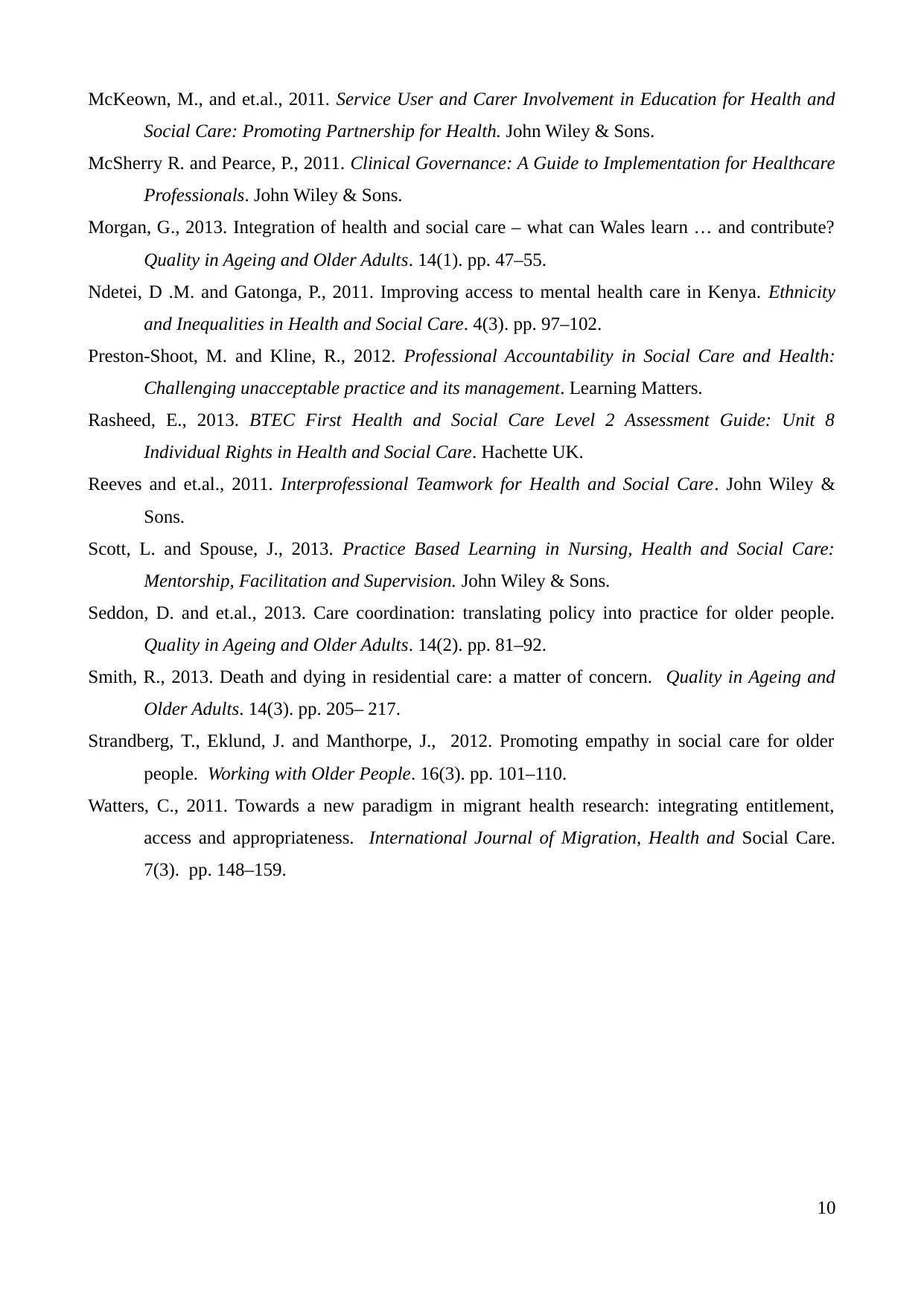
McKeown, M., and et.al., 2011. Service User and Carer Involvement in Education for Health and
Social Care: Promoting Partnership for Health. John Wiley & Sons.
McSherry R. and Pearce, P., 2011. Clinical Governance: A Guide to Implementation for Healthcare
Professionals. John Wiley & Sons.
Morgan, G., 2013. Integration of health and social care – what can Wales learn … and contribute?
Quality in Ageing and Older Adults. 14(1). pp. 47–55.
Ndetei, D .M. and Gatonga, P., 2011. Improving access to mental health care in Kenya. Ethnicity
and Inequalities in Health and Social Care. 4(3). pp. 97–102.
Preston-Shoot, M. and Kline, R., 2012. Professional Accountability in Social Care and Health:
Challenging unacceptable practice and its management. Learning Matters.
Rasheed, E., 2013. BTEC First Health and Social Care Level 2 Assessment Guide: Unit 8
Individual Rights in Health and Social Care. Hachette UK.
Reeves and et.al., 2011. Interprofessional Teamwork for Health and Social Care. John Wiley &
Sons.
Scott, L. and Spouse, J., 2013. Practice Based Learning in Nursing, Health and Social Care:
Mentorship, Facilitation and Supervision. John Wiley & Sons.
Seddon, D. and et.al., 2013. Care coordination: translating policy into practice for older people.
Quality in Ageing and Older Adults. 14(2). pp. 81–92.
Smith, R., 2013. Death and dying in residential care: a matter of concern. Quality in Ageing and
Older Adults. 14(3). pp. 205– 217.
Strandberg, T., Eklund, J. and Manthorpe, J., 2012. Promoting empathy in social care for older
people. Working with Older People. 16(3). pp. 101–110.
Watters, C., 2011. Towards a new paradigm in migrant health research: integrating entitlement,
access and appropriateness. International Journal of Migration, Health and Social Care.
7(3). pp. 148–159.
10
Social Care: Promoting Partnership for Health. John Wiley & Sons.
McSherry R. and Pearce, P., 2011. Clinical Governance: A Guide to Implementation for Healthcare
Professionals. John Wiley & Sons.
Morgan, G., 2013. Integration of health and social care – what can Wales learn … and contribute?
Quality in Ageing and Older Adults. 14(1). pp. 47–55.
Ndetei, D .M. and Gatonga, P., 2011. Improving access to mental health care in Kenya. Ethnicity
and Inequalities in Health and Social Care. 4(3). pp. 97–102.
Preston-Shoot, M. and Kline, R., 2012. Professional Accountability in Social Care and Health:
Challenging unacceptable practice and its management. Learning Matters.
Rasheed, E., 2013. BTEC First Health and Social Care Level 2 Assessment Guide: Unit 8
Individual Rights in Health and Social Care. Hachette UK.
Reeves and et.al., 2011. Interprofessional Teamwork for Health and Social Care. John Wiley &
Sons.
Scott, L. and Spouse, J., 2013. Practice Based Learning in Nursing, Health and Social Care:
Mentorship, Facilitation and Supervision. John Wiley & Sons.
Seddon, D. and et.al., 2013. Care coordination: translating policy into practice for older people.
Quality in Ageing and Older Adults. 14(2). pp. 81–92.
Smith, R., 2013. Death and dying in residential care: a matter of concern. Quality in Ageing and
Older Adults. 14(3). pp. 205– 217.
Strandberg, T., Eklund, J. and Manthorpe, J., 2012. Promoting empathy in social care for older
people. Working with Older People. 16(3). pp. 101–110.
Watters, C., 2011. Towards a new paradigm in migrant health research: integrating entitlement,
access and appropriateness. International Journal of Migration, Health and Social Care.
7(3). pp. 148–159.
10
1 out of 10
Related Documents
Your All-in-One AI-Powered Toolkit for Academic Success.
+13062052269
info@desklib.com
Available 24*7 on WhatsApp / Email
![[object Object]](/_next/static/media/star-bottom.7253800d.svg)
Unlock your academic potential
Copyright © 2020–2026 A2Z Services. All Rights Reserved. Developed and managed by ZUCOL.





